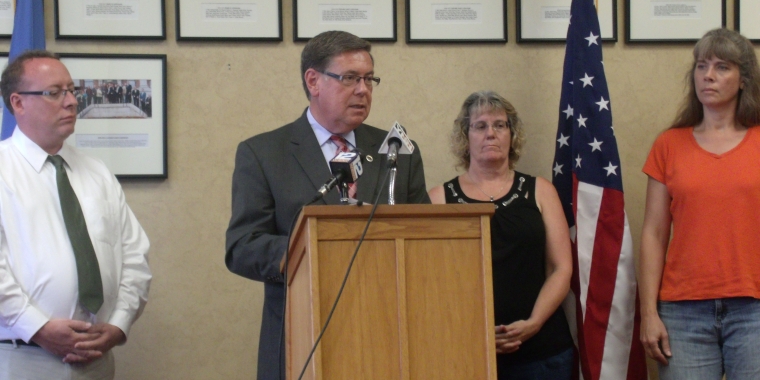
Seward Continues Push For Improved Disaster Prep & Response
James L. Seward
September 11, 2013

CORTLAND, 09/12/13 – State Senator James L. Seward (R/C/I-Oneonta) today continued to advance his multi-prong strategy to enhance the state’s response to natural disasters.
“In recent years we have seen the number and severity of natural disasters spiral increasingly upward,” said Senator James L. Seward. “It is vital that we, as a state, prepare for future natural disasters by constructing better protections for our homes, businesses and infrastructure, streamlining our response, and ensuring that financial resources are available.”
Senator Seward was joined by Cortland County Emergency Management Services (EMS) Coordinator Scott Roman, Cortland County Soil and Water Conservation District Manager Amanda Barber, and residents of the Blodgett Mills area of Cortland who continue to rebuild from summer flooding.
“Whether it be a named storm like Hurricane Irene, Tropical Storm Lee or Superstorm Sandy, or an isolated pocket of severe weather like the downpours that hit Blodgett Mills and other areas this summer, we must upgrade our state’s natural disaster response playbook and ensure that everyone’s needs are met,” Seward added.
Senator Seward is working with a bipartisan coalition of senators in preparing a legislative package set for introduction in Albany that will guide New York State’s long-term recovery and mitigation efforts to contend with the many obstacles that local governments and private property owners deal with in the face of natural disasters.
“The disaster plan ensures that dedicated state funding is available to help with rebuilding efforts. This would be particularly advantageous when the federal government fails to come through with assistance, a circumstance we have been dealing with this summer. Additionally, we need to make sure that workable regulatory policies are enacted so clean-up efforts aren’t hampered by red tape,” Seward said.
Senator Seward’s six-point legislative plan includes the following components:
- The centerpiece of the legislation will be a New York state flood and emergency relief fund –“Funding Emergency Relief Now” (FERN) to assist New York property owners when FEMA or other funding is denied by the federal government;
- A refundable state income tax credit against property taxes paid where homes and businesses have suffered damage that reduce their value (S. 6060A – 2012);
- A state task force on flood prevention and mitigation with regional subcommittees to help communities plan and fund flood prevention measures on a regional basis. The task force would include representatives of the legislature, the state departments of Health, Environmental Conservation, Transportation, State, Homeland Security and Emergency Services, the National Guard, first responders, local government officials and local soil and water conservation districts with benchmarks and deadlines for action;
- Enhanced funding through the environmental protection fund (EPF) for soil and water conservation districts to help local governments plan improved storm water drainage and flood prevention efforts;
- National Guard directed and supported construction assistance in communities where flood mitigation measures have been identified;
- Requiring a simplified and expedited reimbursement process for the state share of any reimbursable flood-related costs by local governments. Failure to process reimbursements to a local government within 60 days would trigger bonus payments to local governments to cover their cost of borrowing to cover funding shortfalls.
-30-
Share this Article or Press Release
Newsroom
Go to NewsroomDairy Day at the Capitol
June 5, 2019

Seward Opposes So-Called "Green Light" Bill
June 5, 2019

Senate Bill Hangs Up on Unwanted Phone Calls
June 4, 2019

